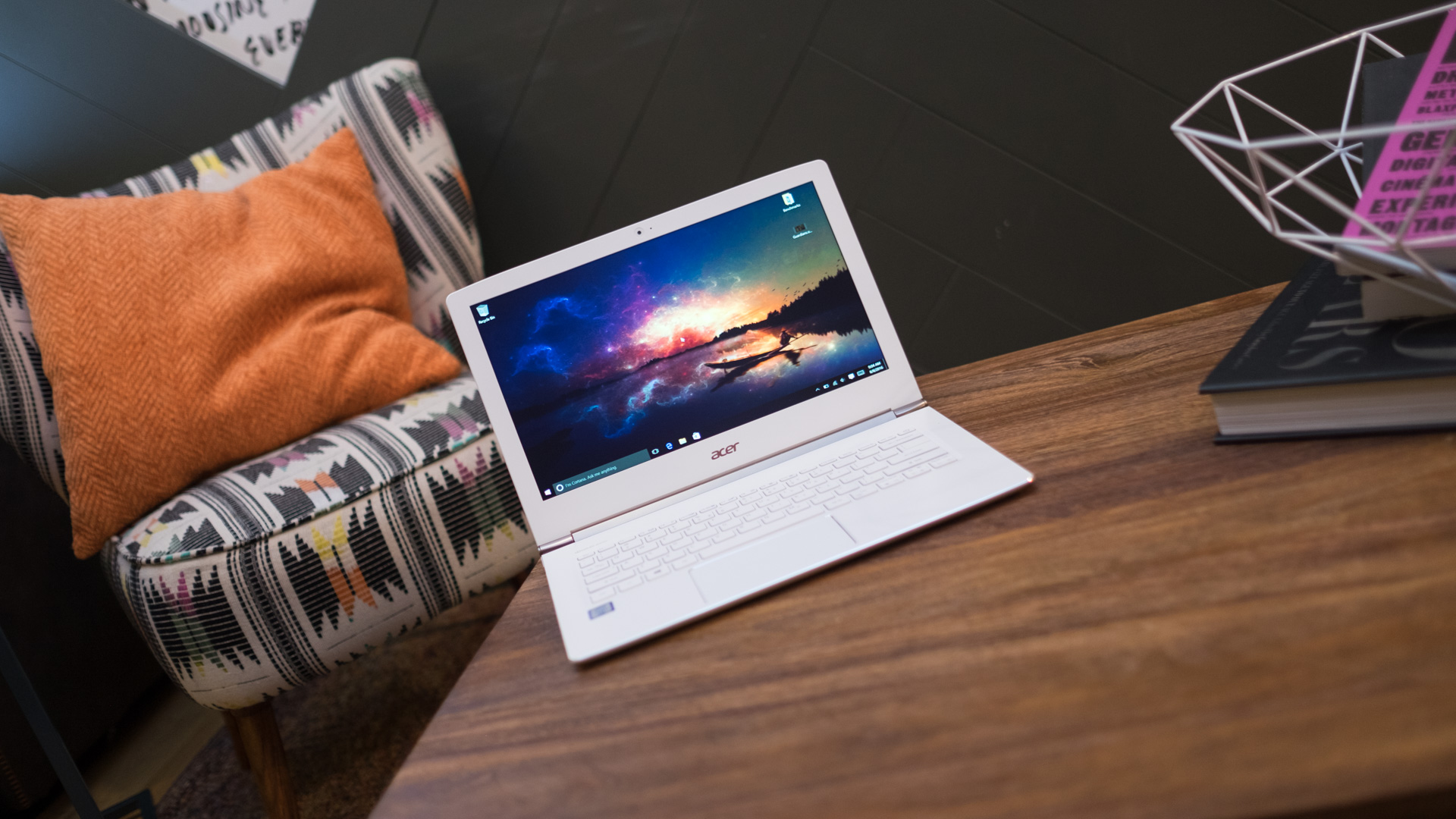Why you can trust TechRadar
As stated earlier, the Acer Aspire S 13 is neither the thinnest nor the lightest Ultrabook on the block. It measures 12.87 x 8.98 x 0.57 inches and weighs about three pounds (1.36kg). The Asus Zenbook 3 beats it out with its 0.46-inch thickness, and it weighs a pound less.
Comparatively, Samsung Notebook 9 measures 13.64 x 9.33 x 0.57 inches, which closely matches the Acer, despite weighing less than two pounds. Meanwhile, a 13-inch MacBook Air is 12.79 x 8.93 x 0.66 and weighs 2.96 pounds (1.35kg).
Although Acer doesn't win the size and weight categories, it makes up for it with performance and features. It is currently one of the few 13-inch notebooks that offers a Core i7 processor, a 512GB SSD, and a touchscreen at a low price point.
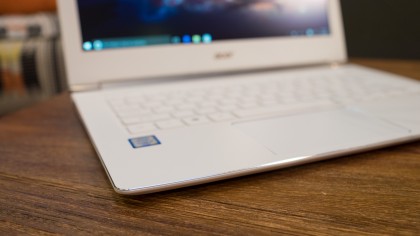
Spec Sheet
Here is the Acer Aspire S 13 configuration sent to TechRadar:
- CPU: 2.5 GHz Intel Core i7-6500U (dual-core, 4MB Cache, up to 3.1 GHz with Turbo Boost)
- Graphics: Intel HD Graphics 520
- RAM: 8GB LPDDR3 SDRAM
- Screen: 13.3-inch, 1,920 x 1,080 anti-glare LED-backlit IPS touchscreen display
- Storage: 512GB SSD
- Ports: 2 x USB 3.0; 1 X USB 3.1 (Type C); HDMI; SD card reader; headphone/microphone jack
- Connectivity: 802.11ac with 2x2 Mu-MIMO technology (Dual-Band 2.4GHz and 5GHz); Bluetooth 4.0
- Camera: 720p webcam
- Weight: 3 pounds (1.36kg)
- Size: 12.87 x 8.98 x 0.57 inches (W x D x H)
The model we tested is top-of-the-line, but it sports a modest $999 (about £756, AU$1,899) price tag. That's quite a value, considering how it includes a 512GB SSD, a full HD (FHD) touchscreen display, a 2.5 GHz Intel Core i7-6500U processor, and 8GB of memory.
Although that's a little more expensive than the razor-thin Samsung Notebook 9, which goes for $949 (about £649, AU$1,247), the Acer offers better performance and hardware. In any case, it's considerably less expensive than a comparable 13-inch Macbook Air, which goes for $1,199 (£999, AU$1,699) and features a slower processor with half the SSD storage of the Aspire S 13.
Neither competitor comes with a touchscreen — a convenient (albeit, not altogether necessary) feature that sets the Aspire S 13 apart from the rest. The inclusion of a USB 3.1 Type-C also puts the Aspire S 13 ahead of the pack when it comes to features.
Sign up for breaking news, reviews, opinion, top tech deals, and more.
Furthermore, while comparable systems such the Samsung Notebook 9 and the considerably higher-priced MacBook Air top out with a 256GB solid-state drive, Acer doubles the storage without breaking the $1,000 price mark.
The Acer Aspire S 13 also comes in ringing for an $749 (£649. AU$1,399) starting price with an Intel Core i5-6200U processor, non-touch 1080p display and 256GB of memory. That's still a very affordable deal, though, the Asus ZenBook UX305 is still cheaper with nearly the same specs at $599 (£599, AU$1,199)
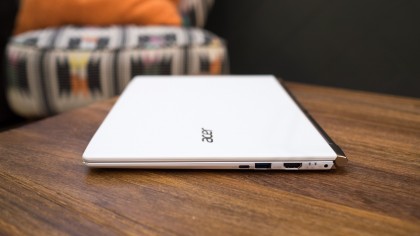
Performance
Acer one-ups the competition by offering a 2.5 GHz Intel Core i7 CPU while most others stick with Core i5 or even Core m3 processors. Although the Asus Zenbook 3 can also be configured with a Core i7 processor, the upgrade will likely make the system cost significantly more than the Aspire S 13.
Benchmarks
Here's how the Acer Aspire S 13 performed in our suite of benchmark tests:
- 3DMark: Cloud Gate: 5,855; Sky Diver 3,569; Fire Strike: 816
- Cinebench CPU: 317 cb; Graphics: 41.43 fps
- PCMark 8 (Home Test): 2,771 points
- PCMark 8 Battery Life: 4 hours and 16 minutes
- Battery Life (techradar movie test): 7 hours and 49 minutes
- Geekbench 3: Single-Core Score: 3,247; Multi-Core Score: 6,884
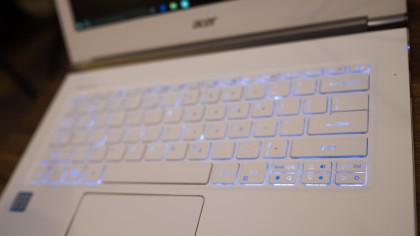
Although it would be a major overstatement to call the Aspire S 13's performance astounding, its benchmarks scores are noticeably better than the both the Samsung Notebook 9 and MacBook Air with their Core i5 processors.
Comparatively, the Notebook 9 achieved 3DMark scores of 5,534 in Cloud Gate and 816 in Fire Strike. While Acer scores a few hundred points higher than Samsung on two of the 3DMark demos, the Fire Strike test showed an identical score. While the MacBook Air averaged 24.91 FPS on the Cinebench graphics test, Acer showed a 66% improvement in comparison.
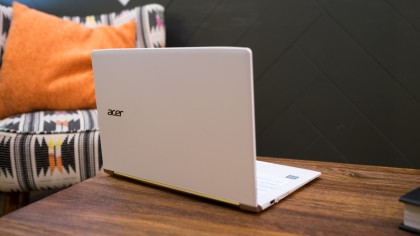
However, the most important area is battery life, and the Aspire S 13 beats out the Notebook 9 by a significant margin despite having a faster CPU. Our looping movie test puts the Acer's battery life at nearly 8 hours, while the Samsung notebook stopped after 4 hours and 20 minutes.
On the other hand, PCMark 8 battery estimate shows a slimmer difference, with the Acer's battery lasting for just over 4 hours while the Samsung ran just under three hours.
If you're looking for the best battery life, the Asus ZenBook UX305 is still the longest lasting machine we've ever tested. The 13-inch Ultrabook ran the PCMark 8 battery test for an uncontested 6 hours and 30 minutes, largely thanks to its power-sipping Intel Core m3 processor.
